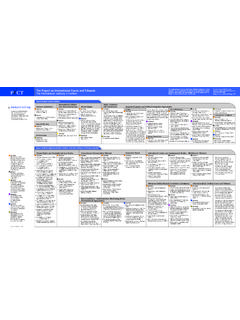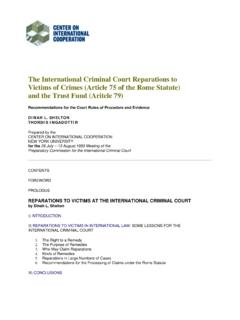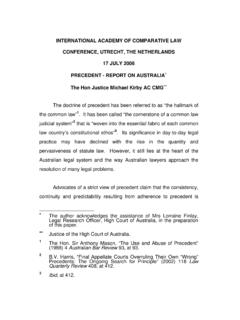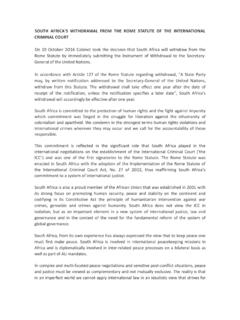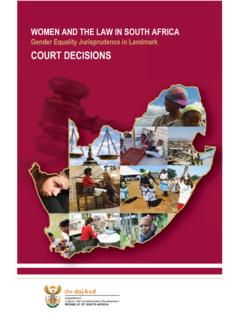Transcription of THE FINANCING OF THE INTERNATIONAL …
1 THE FINANCING OF THE INTERNATIONAL criminal court A discussion Paper BY: Cesare ROMANO Thordis INGADOTTIR ICC discussion Paper #2 CONTENTS FOREWORD ACKNOWLEDGMENTS 1. INTRODUCTION 2. FINANCIAL FRAMEWORK Basic Elements Financial Rules and Regulations Relationship of the court with the United Nations 3. FUNDS OF THE court AND OF THE ASSEMBLY OF STATES PARTIES Assessed Contributions by States Parties The UN Scale of Assessment A Hypothetical Scale of Assessment of the court Possible Adjustments to the Scale of Assessment of the court The Power to Assess Contributions The Duty to Pay Assessed Contributions Other Costs Borne by States Funds Provided by the United Nations The UN Could Provide the Initial Funding of the Assembly of States Parties and the court The UN Could Pay for the Costs of the Assembly of States Parties The Relationship between UN Contributions and Assessed Contributions Voluntary Contributions (Article 116) Voluntary Contributions as Distinct from and Additional to the court s Funds Possible Contributors under Article 116 Nature of Contributions Limitations to Voluntary Contributions Gratis Personnel Other Resources 4.
2 THE BUDGET OF THE court The Nature of the Budget The Jurisdiction of the court The Nature of the court as an INTERNATIONAL criminal court Expenditure Stand By Scenario Operating Scenario Budget Procedure Budget Cycle Preparation of the Budget and Submission to the Assembly The Adoption of the Budget Oversight Mechanisms 5. CONCLUSIONS RECOMMENDATIONS ANNEXES I) Articles , 112-118 of the Rome Statute II) Basic References III) Hypothetical Scale of Assessment for the ICC Budget IV) Tables The FINANCING of the ICC A discussion Paper 1 FOREWORD his paper has been prepared by the Center on INTERNATIONAL Cooperation under the auspices of the Project on INTERNATIONAL Courts and Tribunals (PICT) to provide the Preparatory Commission of the INTERNATIONAL criminal court with issues for consideration. Aware that INTERNATIONAL law is the linchpin of a burgeoning INTERNATIONAL public sector, and that courts, tribunals and other dispute settlement bodies have emerged in virtually every area of INTERNATIONAL activity, in 1996 the Center on INTERNATIONAL Cooperation (New York University) and the Foundation for INTERNATIONAL Environmental Law and Development - FIELD (School of Oriental and Asian Studies, University of London) launched PICT.
3 PICT s mission is to address the legal, institutional and financial issues arising from the multiplication of INTERNATIONAL courts and tribunals and other dispute settlement bodies, as well as from the increased willingness of members of the INTERNATIONAL community to have recourse to them. PICT addresses legal, institutional and financial issues arising out of the proliferation of INTERNATIONAL courts and dispute settlement bodies and the growing number of cases which these bodies are called upon to address. The overall objective is to promote research, training and public education activities that will contribute to the more effective, equitable and efficient delivery of INTERNATIONAL justice. Effectiveness: reinforcing the role of INTERNATIONAL courts and bodies in the administration and development of the INTERNATIONAL legal system; strengthening their credibility as convenient and efficient dispute settlement bodies; ensuring the implementation of their rulings; Equity: reducing financial and structural barriers that limit the ability of less well-endowed actors to use INTERNATIONAL courts and dispute settlement bodies; providing practical know-how and legal skills to their actual and potential users; Efficiency: ensuring the availability of adequate financial means and the use of the best management practices; decreasing costs and length of proceedings by streamlining statutes and rules of procedure.
4 To achieve these general objectives PICT promotes and undertakes research on legal, financial, procedural and access issues which affect the delivery of INTERNATIONAL justice, with the intent of identifying potential solutions. T The FINANCING of the ICC A discussion Paper 2 This discussion paper focus on a crucial component of the future INTERNATIONAL criminal court : its FINANCING . It is intended to provide some ideas for debate at the 2000 meetings of the Preparatory Commission for the INTERNATIONAL criminal court . PICT itself takes no position on the legal questions involved but believes that the views of the papers authors can help to both clarify provisions in the Rome Statute and inform decisions on the FINANCING of the court . We invite readers to comment on the papers directly to the authors or to PICT staff at Shepard Forman Philippe Sands Director Professor of INTERNATIONAL Law, Center on INTERNATIONAL Cooperation London University; PICT Co-Director Barrister, Matrix Chambers PICT Co-Director ACKNOWLEDGMENTS PICT is grateful to the Ford Foundation, the John T.
5 And Catherine D. MacArthur Foundation, the William and Flora Hewlett Foundation, and the Volkswagen Stiftung for their support. The authors would like to thank Paul C. Szasz for his collaboration and recommendations. Many thanks to the Registrar of the INTERNATIONAL criminal Tribunal for the Former Yugoslavia, Ms. Dorothee de Sampayo Garrido-Nijgh, and the Registrar of the INTERNATIONAL criminal Tribunal for Rwanda, Mr. Agwu Ukiwe Okali, for helpful information. Thanks to Roger S. Clark, Mark Gilpin and Dirk Solomons for providing helpful comments on early drafts of this paper. Special thanks to all participants at an informal seminar on the FINANCING of the INTERNATIONAL criminal court , sponsored by PICT and the Coalition for an INTERNATIONAL criminal court , for their comments and observations. Finally, thanks to Tara Conklin and Kristen Boon for their research and to Todd Diamond and Charles Graybow for their help in the editing.
6 The views presented in this paper are those of the authors and do not necessarily represent the ones of the collaborators or the commentators. The FINANCING of the ICC A discussion Paper 3 1. INTRODUCTION According to article 113 of the Rome Statute:1 Except as otherwise specifically provided, all financial matters related to the court and the meetings of the Assembly of States Parties, including its Bureau and subsidiary bodies, shall be governed by this Statute and the Financial Regulations and Rules adopted by the Assembly of States Parties . Part 12 of the Rome Statute details the basic elements of the financial framework for the INTERNATIONAL criminal court [hereinafter the ICC]. The Financial Regulations and Rules [hereinafter the Financial Regulations] and the budget for the first year, shall be drafted by the Preparatory Commission for the INTERNATIONAL criminal court .
7 The Assembly of States Parties will consider and adopt the committee s The remaining task is huge, as this involves highly political as well as technical aspects, which largely remain to be worked out. In addition, the implementation of ICC s unique mandate and structure, which are different from existing INTERNATIONAL judiciary bodies, requires some inventiveness on part of the Preparatory Commission and the Assembly of States Parties. One of the most important factors of the ICC s FINANCING is its funding. The Rome Statute stipulates the funds of the court and the Assembly of State Parties as assessed contributions made by State Parties, and funds provided by the United Nations subject to the approval by the General Assembly. In addition, the court may receive voluntary contributions, in accordance with relevant criteria adopted by the Assembly of State Parties. The ICC application of these resources must take into consideration various factors, most importantly the preservation of the court s independence and impartiality.
8 The unique challenge is to predict the ICC s expenditures. As the court s future activities are unknown, and as the court s structure and operation are still being worked out in the Rules of Procedure and Evidence,3 any estimate will be insufficient. However, some speculation about the court s start-up costs, including what resources are necessary for the minimum operation of the stand-by years, might be feasible. The Assembly of State Parties is the sole budgetary authority of the court , however all budgetary procedures are as yet undecided. The Rome Statute does not stipulate who shall prepare the budget, who shall submit it to the Assembly of States Parties, and how it shall be adopted. The procedures are further complicated as the Statute does not provide the court with a secretariat. The adopted procedures will 1 Rome Statute of the INTERNATIONAL criminal court , Adopted in Rome on 17 July 1998, UN Doc.
9 PCNICC/1999/INF/3. 2 Each State Party shall have one representative in the Assembly. Other states that have signed the Rome Statute Final Act may be observers to the Assembly; see the Rome Statute, art. This representation differs significantly from the Preparatory Commission, which consists of representatives of states that have signed the Final Act and other states that were invited to participate in the Rome Conference. The FINANCING of the ICC A discussion Paper 4 inevitably effect the independence of the Chambers and the Office of the Prosecutor, as well as the extent of the Assembly s authority versus the court . This paper intends to address some issues for consideration by the Preparatory Commission for the INTERNATIONAL criminal court and the Assembly of State Parties. Its coverage is far from being inclusive, but hopefully extensive enough to facilitate some discussion during the coming planning of the ICC s FINANCING .
10 2. FINANCIAL FRAMEWORK Basic Elements The ICC is an independent INTERNATIONAL organization established by a treaty. As the court does not function within the wider scope of an INTERNATIONAL organization, it does not enjoy institutional support. Rather, it will need to establish and operate its own financial and administrative system. Different from most other courts and tribunals, the court is therefore responsible for its own budget preparation and collection of Despite the increased responsibilities resulting from the court 's self-sustaining position, the arrangement involves considerable benefits. The court 's financial framework is established and developed solely for the needs of an INTERNATIONAL judiciary body, which can differ considerably from bigger institutions also engaged in different operations. The court 's own tailored structure and procedures should therefore be well equipped to promote effective and competent organization.
